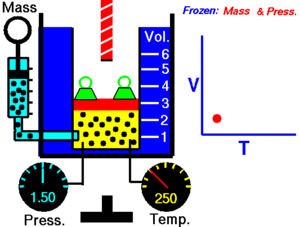English [ edit ] animation demonstrating the relationship between volume and temperature according to Charles's law Alternative forms [ edit ] Etymology [ edit ] Named after French scientist Jacques Charles
Pronunciation [ edit ] Proper noun [ edit ] Charles 's law
( physics ) law stating that the density of an ideal gas is inversely proportional to its temperature at constant pressure .
2015 Chemistry in Focus: A Molecular View of Our World , page 291 :You can observe the effects of Charles's law in a heated room on a winter's day. The air near the ceiling is warmer than the air near the floor. When air is heated, it expands according to Charles's law , lowering its density and causing it to rise.
Synonyms [ edit ] Related terms [ edit ] Translations [ edit ] physical law stating the density of an ideal gas is inversely proportional to its temperature at constant pressure
Arabic: قَانُون شَارْلْ m ( qānūn šārl )
Basque: Charlesen legea
Belarusian: зако́н Ша́рля m ( zakón Šárlja )
Bulgarian: закон на Шарл m ( zakon na Šarl )
Catalan: llei de Charles i Gay-Lussac f llei de Gay-Lussac f llei de Charles f
Chinese:
Mandarin: 查理定律 ( Chálǐ dìnglǜ ) , 查理-蓋-呂薩克定律 / 查理-盖-吕萨克定律 ( Chálǐ-Gài-Lǚsàkè dìnglǜ )
Czech: Charlesův zákon m
Estonian: Charles'i seadus
Finnish: Charlesin laki
French: loi de Charles f
German: erste Gesetz von Gay-Lussac n Gay-Lussacsches Gesetz n Gesetz von Charles n Charlessches Gesetz n
Greek: νόμος του Σαρλ m ( nómos tou Sarl ) , νόμος της ισόχωρης μεταβολής m ( nómos tis isóchoris metavolís )
Hebrew: חֹק שָׁארְל m ( khók Shárl )
Hindi: चार्ल का नियम m ( cārla kā niyam )
Hungarian: Charles-törvény Charles és Gay-Lussac törvény
Indonesian: hukum Charles
Irish: Dlí Charles m
Italian: prima legge di Gay-Lussac f legge di Charles f
Japanese: シャルルの法則 ( シャルルのほうそく, Sharuru no hōsoku )
Korean: 샤를의 법칙 (ko) ( Syareurui beopchik ) , 샤를과 게이뤼삭의 법칙 ( Syareulgwa Geirwisagui beopchik )
Latvian: Šarla likums m
Macedonian: Шарлов закон m ( Šarlov zakon ) , закон на Шарл и Геј-Лисак m ( zakon na Šarl i Gej-Lisak )
Malayalam: ചാൾസ് നിയമം ( cāḷsŭ niyamaṁ )
Persian: قانون شارل ( qânun šârl ) , قانون حجم ( qânun hajm )
Piedmontese: lej ëd Charles f
Polish: prawo Charles'a n
Portuguese: lei de Charles f
Romanian: legea lui Charles f
Russian: зако́н Ша́рля m ( zakón Šárlja )
Scottish Gaelic: Dlighe Charles f
Serbo-Croatian:
Cyrillic: Шарлов за́кон m
Roman: Charlesov zákon m
Sinhalese: චාල්ස්ගේ නියමය ( cālsgē niyamaya ) , චාල්ස් නියමය ( cāls niyamaya )
Slovak: Charlesov zákon m
Spanish: ley de Charles f
Swedish: Charles lag c Gay-Lussacs första lag c Gay-Lussacs lag c
Tamil: சார்லசின் விதி ( cārlaciṉ viti ) , கனவளவு விதி ( kaṉavaḷavu viti )
Turkish: Charles yasası
Ukrainian: зако́н Ша́рля m ( zakón Šárlja )
Vietnamese: định luật Charles định luật Gay-Lussac
Anagrams [ edit ] 
